 |
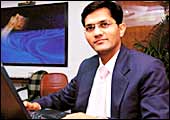 |
| ING's Adenwala (R) and
Kotak's Shah: Given the number of MFs being launched,
fund managers are much in demand |
Success
comes with its own set of problems. a case in point is the mutual
fund (MF) industry which has witnessed stellar growth in the last
one year on the back of a booming stock market. So, even while
the industry's assets under management (AUM) have grown almost
32 per cent in the last one year to over Rs 2 lakh crore, dearth
of people-CEOs, chief investment officers (CIOs), fund managers,
marketing heads, analysts, even dealers-is staring the industry
in the face.
"Brilliant (lateral career) opportunities
and monetary gains have seen (huge) people churn in the industry,"
says Sanjay Prakash, CEO, HSBC Asset Management Company (AMC).
The situation in the industry is akin to a game of musical chairs,
well, with a slight difference, with more chairs being progressively
added.
Recently, at the fund manager level alone
there were several shifts; Vinay Kulkarni from UTI AMC joined
Deutsche Mutual Fund, Kenneth Andrade from Kotak Mutual Fund joined
Standard Chartered Mutual Fund and Deven Sangoi quit Birla AMC
to join Prudential ICICI. And Ashish Ranawade moved out of UTI
AMC to join ING Vysya Mutual Fund to handle portfolio management
services. With new products such as derivative funds hitting the
market and competitors such as hedge, private equity and FII (foreign
institutional investors) funds also vying for the same set of
people, it is an out and out employees' market.
"With five to six funds (FIIs) being
launched every month, the scarcity of talent is being clearly
witnessed in this market," says Ajay Bagga, CEO, Grange Advisory
(a Sabre Capital firm that is launching a new mutual fund in India
through a joint venture with Temasek).
Welcome Outsiders
With a 40 to 100 per cent jump in salaries
in the industry, a scarcity of talent and booming business, even
professionals from other industries are marching in to fill in
gaps across functions. Vikrant Gugnani, earlier with Citibank,
joined as the CEO of Reliance Mutual Fund recently. And Rana Vikram
moved from ABN Amro to head the distribution and marketing function
at the bank's AMC.
"Almost a third of this sector's needs
has to be met from other related sectors," says Puneet Singh,
Associate Director, Executive Access, a headhunting company active
in hiring for funds. So, apart from grooming junior level staff,
mainly young analysts to take care of future manpower crisis,
most MFs are aggressively recruiting people from non-AMC backgrounds
(mainly insurance and banks), and retail brokerage houses and
also picking up fresh graduates from B-schools and chartered accountants.
"As we expand our operations, we have, for the first time,
recruited 10 MBA graduates for our sales operation," says
HSBC's Prakash.
| Private wealth managers have to produce
investment results for clients and manage relationships as
well |
Of
the three functions in the industry-money management, operations
and business development-the dearth of talent is more acute in
the first two, as sales & marketing people from banks are
easy targets and converts to man mutual fund marketing. The challenge
for outsiders joining the industry is that there is a lot of catching
up to do with regard to issues like risk compliance, legal framework
and fund accounting. And fund management professionals, already
a limited pool, are increasingly flirting with openings in FIIs,
private equity and hedge funds.
There is also a new trend of MFs scouting
for sales & marketing professionals to head their AMCs as
CEOs. "I have been approached for the post of an AMC CEO.
AMCs are targeting sales and marketing guys as they know the market
reality, can handle distributors, besides being well versed with
the functioning of an AMC," says a head of sales & marketing
at a foreign mutual fund.
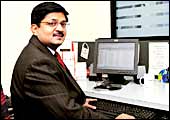 |
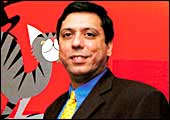 |
| HSBC's Prakash (R) and
Grange Advisory's Bagga: MFs are now hiring sales and
marketing professionals |
Carrots And More Carrots
"Fund mangers are trying to become specialists
(in verticals such as hedge funds and private wealth management),"
says Paras Adenwala, CIO (Equity), ING Vysya Mutual Fund, himself
an erstwhile equity desk head at Birla Mutual. MF organisations
are willing to promote people to take on bigger roles and responsibilities
as a means to retain them.
After Ajay Bagga quit Kotak AMC in May 2005
to join Grange Advisory, the group made Nilesh Shah, till then
Executive Director (Equity Strategy), Kotak Securities, the President.
"Being associated with Kotak Securities and Kotak Portfolio
Management Services, it was a challenge for me to take the responsibility
at the AMC and try to bring it to the same position as the other
financial businesses of Kotak," says Shah, a 12-year veteran
of Kotak.
Variable income-going up to as high as 55
per cent for fund mangers, 50 per cent for marketing and sales
professionals and 40 per cent for operations people-is also the
industry's answer to not just incentivise performance but also
to make work more challenging and remunerations more competitive
compared to say hedge funds, where mangers get a performance fee.
MF managers are (still) paid mainly on the basis of the amount
of assets managed, regardless of the fund's performance.
On the flip side, the drudgery of managing
customer queries (even from a small investor who has put in just
Rs 10,000), distributors and sales & marketing on a daily
basis is making a few MF professionals turn to boutique fund houses,
where the core job remains fund management, and only that.
COUNSELLING
Help, Tarun!
 I am a BSc student majoring in physics and want to do my post
graduation in the field of computers. Keeping my future and the
present job scenario in mind, would an MCA (Masters in Computer
Application) or an MSc (Information Technology) be the right qualification
to get? Will this help me get a job in a software company? Also,
what are the career prospects if I do a course in multimedia?
I am a BSc student majoring in physics and want to do my post
graduation in the field of computers. Keeping my future and the
present job scenario in mind, would an MCA (Masters in Computer
Application) or an MSc (Information Technology) be the right qualification
to get? Will this help me get a job in a software company? Also,
what are the career prospects if I do a course in multimedia?
An MCA or MSC in information technology will always stand you
in good stead when you join the job market. As for the software
industry, many companies today recruit directly from the campus.
Besides, if you do your post graduation from a reputed institute
and get good grades, getting a job should not be a problem. Whichever
institute you opt for, find out when and which companies conduct
on-campus interviews there. If you do a multimedia course, then
you have the option of working in an ad agency or a software company
working in the media arena. But then the number of companies operating
in this field is much smaller compared with the software industry.
I am a 30-year-old doctor from Moga,
Punjab, and am interested in becoming a DMP (designated medical
practitioner). People planning to immigrate are required to undergo
medical examination and only a DMP is authorised to do so. Please
advise what one needs to do to become a DMP. Also, what other
related areas can I explore? How about medical outsourcing?
DMP is a popular concept in Canadian immigration
and the country has DMPs in Amritsar, Ludhiana and Chandigarh.
Appointments are based on the requirement in a particular geographical
area. If you want to become a DMP for Canada, you can get information
from their consular office in Chandigarh or from the Canadian
High Commission's website. Similary, you can cull relevant information
from the internet for other countries. In case of Canada, once
your application is approved, you are put on a two-year probation.
After which you are an established DMP. As for outsourcing, the
jobs available are in the field of medical billing, trancription
and insurance claims. If you are interested in any of these, you
should approach a BPO outfit.
I am a 24-year-old graduate working as
a copy writer in a reputed ad agency in Hyderabad for the past
two years. I also do a bit of freelancing on the side. However,
I am not happy with my job or working 9-5. It would be ideal if
I could work from home and also make good money at the same time.
Do I need additional skills to work in a bigger ad agency in Hyderabad
or in other cities? Please advise.
If you are really good at your work, then
you can make good money from freelancing. But for that you need
to be well established in this field and have good contacts. You
have worked only for two years and unless you have a great portfolio
to show, you will not be able to muscle your way in a industry
which is highly competitive. You could opt to work in Mumbai or
Delhi, which have a large number of established ad agencies, but
then your cost of living would go up. I would suggest that you
work till you make a mark in your field. Then you can have the
luxury of freelancing and also making good money.
I am a 23-year-old economics graduate
from Delhi University and have done my MBA from a reputed institute.
For the past six months, I have been working with an insurance
company. However, I am not interested in my present job or the
industry as such. I am interested in becoming a newsreader. How
do I go about it? Do I need to do any course in this regard. Also,
will my economics and MBA background help if I opt for a business
channel?
Your economics and MBA background will definitely
be an asset if you work in a business channel. Most media houses
will give you in-house training and you will have to start with
reporting before you get a chance to be an anchor. At the same
time, there are a lot of institues offering courses in newsreading.
You can do these part-time. It would be ideal if you could do
a course in broadcast journalism from a reputed institute like
the Indian Institute of Mass Communication, Delhi. Then you should
not have a problem getting a good job. Also, given that there
are so many new channels being launched, keep a lookout for job
ads. You can also go to the websites of various channels and see
what vacancies they have and apply directly.
Answers to your career concerns are contributed
by Tarun Sheth (Senior Consultant) and Shilpa Sheth (Managing
Partner, US practice) of HR firm, Shilputsi Consultants. Write to
Help,Tarun! c/o Business Today, Videocon Tower, Fifth Floor, E-1,
Jhandewalan Extn., New Delhi-110055..
Sub-brokers,
Anyone?
A new career for
stock market professionals.
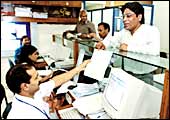 |
| Taking stock: The market's
only got better |
The
economy is on a roll, corporate profits are at an all time high
and the stock markets are booming. Little wonder, there is hectic
activity amongst market middlemen, with the number of registered
sub-brokers with SEBI going up to 12,817 (2003-04) from a mere
1,264 (2002-03).
And guess who is becoming a sub-broker? It
is professionals with stock-broking experience (analysts and business
development people working with brokerage houses) and CAS. "Today
becoming a sub-broker has become quite easy for professionals
with a knack for the markets," says Amitabh Choudhary of
Amiant Stock Management, a New Delhi-based sub-broker for Geojit
Securities. Choudhary jumped on the bandwagon six months ago,
after working with Indiabulls Securities and Hotline Capital.
All one needs to become a sub-broker is an
initial investment of Rs 3-5 lakh on getting a broker's sub-broker
franchisee, VSAT connection, and the like. With broker:sub-broker
revenue share on the commission earned starting at 50:50 and moving
up to 30:70 as volumes rise, and with lot more products to hawk
(commodity trades and depository services), it's time you looked
at becoming a market middleman.
-Shailesh Dobhal
Temps:
Rights & Responsibilities
Here's what you need
to know as a temp.
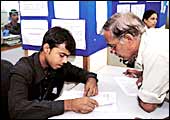 |
| Nothing permanent: But do
read between the lines |
If
you are one of the over one lakh temporary workers (temp) that
India Inc across sectors is hiring to bail it out of temporary
manpower needs or crisis, it helps to know a few ground rules.
As a temp, you can register with multiple
temping companies. The job contract is signed between the temping
company and the temp, but only after the temping company's client
has validated the candidate. As a temp your provident fund, group
insurance, gratuity and medical insurance is provided by the temping
agency.
After mapping the industry, experience and
the city, a salary primer is created by the temping agency, which
also negotiates the temp's salary with the client. But a temp's
deliverables are the responsibility of the client and not the
temping company, managed services contracts notwithstanding. The
temping agency also lays down the appraisal frequency along with
the parameters. When it comes to leave, candidates are informed
of the leave roster by the temping agency, but approval needs
to be taken from the client and the temping agency needs to be
informed.
-Amanpreet Singh
|








 I am a BSc student majoring in physics and want to do my post
graduation in the field of computers. Keeping my future and the
present job scenario in mind, would an MCA (Masters in Computer
Application) or an MSc (Information Technology) be the right qualification
to get? Will this help me get a job in a software company? Also,
what are the career prospects if I do a course in multimedia?
I am a BSc student majoring in physics and want to do my post
graduation in the field of computers. Keeping my future and the
present job scenario in mind, would an MCA (Masters in Computer
Application) or an MSc (Information Technology) be the right qualification
to get? Will this help me get a job in a software company? Also,
what are the career prospects if I do a course in multimedia?

